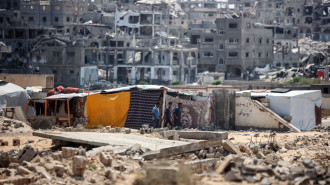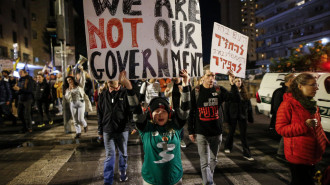Iraqi government says US-led coalition responsible for airstrike on PMF
The Iraqi government strongly condemned an apparent US airstrike that killed at least four members of the Popular Mobilisation Forces (PMF) in the central province of Babylon. The strike, which took place late Tuesday night, has been described by Iraqi officials as "a serious breach of the country's sovereignty."
The airstrike comes as regional tensions is on the rise after an Israeli airstrike in Beirut that Israel claims killed Hezbollah's most senior commander and then Israel assassinated Hamas's political leader Ismail Haniyeh in Tehran overnight.
"International Coalition forces committed an atrocious crime and a blatant attack. They targeted, with fighter jets coming from beyond the borders, Iraqi sites belonging to the security forces in northern Babil (Babylon) province at 22:45 on Tuesday, 30 July, leading to the martyrdom of several members of our security forces in the Popular Mobilisation Forces and injuring others without any justification for this reckless, irresponsible act of aggression," Major General Yahya Rasool Abdullah, spokesperson for the Commander-in-Chief of the Armed Forces, declared in a statement.
"Such serious and uncalculated violations significantly undermine all efforts, mechanisms, and contexts of joint security work to combat ISIS in Iraq and Syria. They could drag Iraq and the entire region into conflicts, wars, and serious repercussions. Therefore, we hold the International Coalition forces fully responsible for these consequences of committing this heinous aggression," Abdullah added.
"Such violations significantly compromise the stability and security efforts in the region. The sovereignty of Iraq must be respected, and we will take all necessary measures to ensure this." he said. He further emphasised that "the ongoing operations by US forces against official Iraqi sites are unacceptable and must stop immediately. We demand full accountability and justice for the lives lost and the injured in this unprovoked attack."
"We expect the international community to stand with Iraq in condemning this aggression. The safety and security of our citizens are paramount, and we will not tolerate any actions that threaten our sovereignty. The Iraqi government will pursue all necessary legal and diplomatic channels to ensure that such violations do not occur again," Abdullah concluded.
Acting Speaker of the Iraqi Parliament, Mohsen Al-Mandalawi, also condemned the airstrike, describing it as a blatant violation of sovereignty. "We strongly reject the continuation of US military operations targeting official sites and institutions belonging to the Iraqi state. The repetition of such actions is a clear provocation and does not contribute to building stable and positive bilateral relations," Al-Mandalawi stated.
He offered his condolences to the families of "the martyrs", and hoped for a swift recovery for the injured.
The New Arab contacted Basim al-Awadi, spokesperson of Iraq's government, but he was not immediately available to comment.
Tuesday's US airstrike in Iraq was the first since February, when the US targeted hundreds of sites linked to Iran's Revolutionary Guard and militias. The Popular Mobilisation Forces (PMF), a state-sanctioned paramilitary group of 150,000 members, is heavily influenced by Iran.
Iraq hosts some 2,500 US troops as well as Iran-backed militias. Attacks on US forces in Iraq have increased since Israel's war on Gaza began last October.
Moreover, Iraq plans for the US-led coalition to start withdrawing in September and complete by September 2025, with some US troops likely staying in an "advisory" role. The US, with the UK, previously invaded Iraq illegally in 2003, withdrew some forces in 2011, and then returned in 2014 to combat ISIS.
"We strongly condemn targeting one of the Iraqi security forces units in Babylon province and consider it a breach of Iraq’s sovereignty. We call on all to keep calm and not give statements as the Iraqi government should clarify its position because this breach is not acceptable while we are waiting for the withdrawal of the US forces and the start of a new era of joint relations in all aspects with the US forces," Karim Abu Suda, head of the Iraqi parliament's defence and security committee, told TNA.
Addressing the timing of the strike, Abu Suda said, "I think it is a reaction after Ain Al-Asad base was targeted, I think it is a normal reaction. The Iraqi and US sides must experience restraint until the joint negotiations end for a new transitional plan for strategic cooperation between the Iraqi government and the US forces."
Regarding potential impacts on relations between Iraq and the US, he stated, "We support the policies of Prime Minister Mohammed Shia' Sudani, either foreign or internal, and we think that the assault will not affect the joint relations between the two sides. Restraint is needed until the negotiations end."
For their part, pro-Iran militias vowed revenge and are calling for the expulsion of the US-led coalition from Iraq. In a statement following the attack, the PMF did not directly accuse any party of responsibility but emphasised the timing and severity of the assault.
"The Islamic Resistance Kata'ib Hezbollah has always defended the oppressed and will take the appropriate decision after consulting with its brothers in the Iraqi Resistance Coordination," the group stated, reiterating their commitment "to avenge the blood of the martyrs".
"The American enemy launched a treacherous attack with its drones from the Ali Al-Salem base in Kuwait, targeting a group of drone experts who were planning to conduct new technical experiments to improve the efficiency of reconnaissance drones to monitor the sacred Karbala borders and its external roads, to participate with the Iraqi security forces to protect the visitors of the Arbaeen of Imam Hussein (peace be upon him)," the statement claimed.
US officials, speaking on condition of anonymity to Reuters, confirmed the airstrike in Musayib, Babil (Babylon) province, and claiming it as a "defensive action" targeting militants preparing drone attacks that posed a threat to US and coalition forces. "This action underscores the United States' commitment to the safety and security," said one official.
While Kataib Hezbollah is mourning their casualties in Baghdad, an American MC-12W in the air orbiting. 🕵️♂️🇺🇸#Iraq pic.twitter.com/9Fiv99k88i
— Tammuz Intel (@Tammuz_Intel) July 31, 2024
According to Iraqi police and medical sources, the airstrike targeted a base south of Baghdad used by the PMF, a state-sanctioned group dominated by Iran-aligned militias. This incident marks the first known US action in Iraq since February, when the US military launched strikes in Iraq and Syria against over 85 targets linked to Iran's Revolutionary Guard and Iran-aligned militias.
Ibrahim al-Amiri, an Iraqi political analyst, told TNA, "The timing of targeting the Iran-backed militias in Iraq, which coincides with the assassination of Hamas's political leader Ismail Haniyeh in Tehran overnight and Hezbollah senior figure Fuad Shukr, is to mix the cards and convey the message to the axis of resistance that they can reach wherever and whenever they want for protecting Israel’s national security."
He also suggested that despite official statements, he believes Israel might be behind the attack, and while militias are expected to respond, there would be "no consequences" on Iraq, as Iraqi political sides would likely condemn the attack without significant follow-up.
According to the Sabrin Telegram channel, the procession for the four killed will take place this afternoon in front of the headquarters of the PMF in Baghdad.
As Iraq navigates the complex dynamics of hosting US forces while managing its relationship with Iran, the recent airstrike has added another layer of complexity to the already volatile environment. The Iraqi government's strong reaction and the potential for further militia retaliation underscore the fragile balance in the region and the ongoing challenges in maintaining stability.
![Members of Iraq's PMF march in a symbolic funerary parade in Baghdad on 29 June, 2021, in remembrance of those killed in a recent US raid. [Getty]](/sites/default/files/styles/large_16_9/public/2021-06/GettyImages-1233712994.jpg?h=903dff9f&itok=kJT7O4hP)






 Follow the Middle East's top stories in English at The New Arab on Google News
Follow the Middle East's top stories in English at The New Arab on Google News


